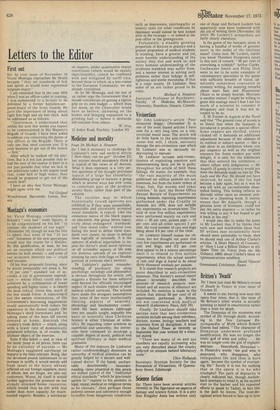Montagu's economics
Sir: Victor Montagu, contemplating Britain's " very bad" trade figures, is to be congratulated on his bid " to outsoar the shadows of our night" (November 10), though he was the first to admit that none of his "15 per cent" horsemen of the new apocalypse would stay the course for a lifetime. By this qualification, at least, he has set an example which our political betters (in both senses) — and some of our economic mentors too — could well emulate.
Of his four proposals (leaving, since he would presumably not press it, his " 15 per cent" standard out of account), a cut in government expenditure — whose effect could also be achieved by a combination of lower spending and higher taxes — is clearlyr the most critical. Given this, much of the rest would follow. A reductionrif not the entire elimination, of the Government's borrowing requirement would automatically both reduce the expansion in the money supply (Mr Montagu's third horseman) and, by taking some of the heat off excess demand at home, diminish the country's trade deficit — which, along with a lower rate of domestically generated inflation, is, of course, the ultimate object of the exercise.
Even if this failed — and, in view of the latest jump in oil prices, there can be no certainty of success — Mr Montagu's suggested surcharge on imports is the least relevant. Being, like the devalued pound, tantamount to an increase in tariffs, it would merely add fresh insult to the injury already inflicted on our foreign suppliers, many of whom, lest we forget, are also our customers. Worse, by itself it would further aggravate the pressure on our already strained home resources, which would thus be left with less rather than more capacity for muchneeded exports. Besides, a surcharge on imports, unlike quantitative import restrictions (which would be equally objectionable), cannot be combined with and mitigated by tariff cuts, beyond those to which, as a late-corner to the European Community, we are already committed.
So let Mr Montagu, and the rest of us, rather urge the Government that it should concentrate on getting a tighter grip on its own budget — which does not mean, as the Chancellor would have us believe, slamming on the brakes and bringing expansion to a grinding halt — before it demands self-restraint from others. .
W. Grey 12 Arden Road, Finchley, London N3


































 Previous page
Previous page